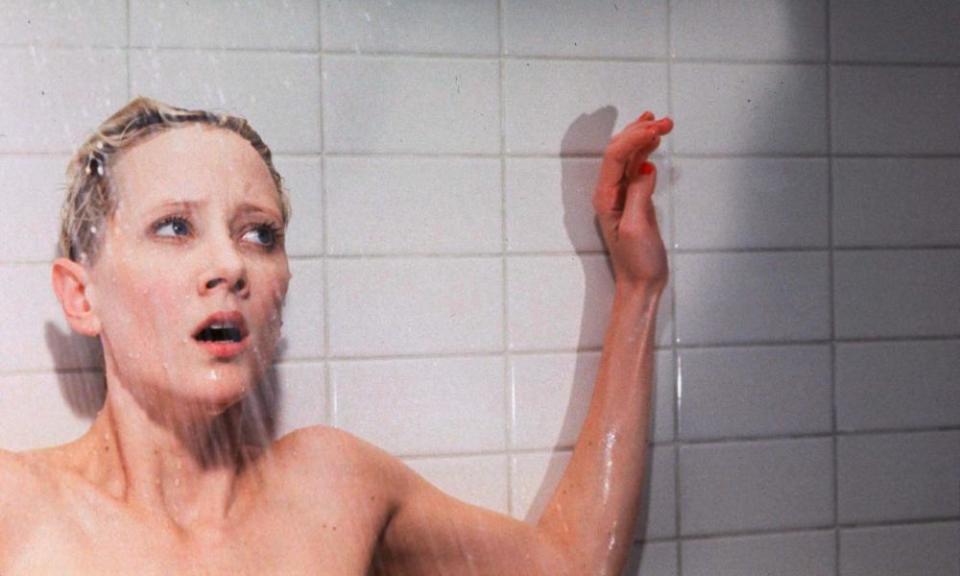Anne Heche was a little too stylish and smart for Hollywood

The movies never really knew what to do with Anne Heche. Her gamine beauty and quizzically sharp intelligence were not easily absorbed into the Hollywood templates: she was not an obvious heteromantic lead and often complained that news about her relationship with Ellen DeGeneres in the 90s cost her many film roles, when the overwhelmingly straight industry was in hock to fatuous “lipstick lesbian” stereotypes. (As it happened, all her other relationships were with men.)
She was too potent and pointed a presence to be comfortably cast in the traditional supporting roles of sister, colleague or best friend. Heche was charismatic and cool, with a terrific camera presence, an intriguing and sexually charged opaqueness, on the verge of disillusionment or hostility. Maybe longform TV was a better platform for her complexity, although it was clear that she was developing some excellent work in cinema in character roles and dark comedy.
Heche made her breakthrough in the mid-90s as Maggie, the resentful, bewildered wife of Johnny Depp’s undercover cop in Donnie Brasco, unable to cope with his strange unexplained behaviour. She was also the angry and suspicious local girl Missy, in the slasher hit I Know What You Did Last Summer and her spikier short hair was a telling marker of how very different, both as character and actor she was to the long, lustrous-haired female leads. In the political satire Wag the Dog, she was the cynical presidential aide, increasingly anxious at the outrageous lies that she is helping to promote.
In fact, Heche could and did play a conventional female lead – opposite no less an old-school A-lister than smouldering Harrison Ford in the romantic comedy-drama Six Days Seven Nights in which she plays the glitzy fashion editor with a normcore fiance (David Schwimmer), who has to take a rickety old prop plane to a shoot in Tahiti and finds herself falling for the boozy alpha-male pilot (Ford) when they are stranded on a remote island after a storm. The movie was a modest success and Heche did well, but it was an atypical role. That same year, Gus Van Sant cast her in the Janet Leigh role in his famous, or notorious, shot-for-shot remake of Hitchcock’s Psycho. Her very existence in that role is fascinating: just being Marion Crane constituted a sophisticated critical commentary on Marion and her awful destiny. Heche had a gimlet-eyed, alienated approach, as if she had from the outset absorbed the nightmare of the Bates Hotel.

Her most interesting roles came as small parts in the succeeding decade – she was Clara, the sister-in-law to Nicole Kidman in Jonathan Glazer’s eerie mystery Birth, about the widow confronted by what appears to be the reincarnation of her late husband in the form of a small child. She was excellent in David Mackenzie’s LA movie Spread, about the older woman who finds herself in a relationship with Ashton Kutcher’s blandly narcissistic gigolo who becomes her “kept man” while heartlessly cheating on her.
My favourite Anne Heche film is the one that is the most outrageous, the most forthright about the violent energy that she seemed in so many other roles to be keeping under control: Onur Tukel’s 2016 film Catfight, where she plays an experimental artist humiliatingly reduced to waitressing at catered events. At one of these, she realises that the guests include a college contemporary, a haughty trophy wife played by Sandra Oh, whom she remembers being obnoxious. Their intense mutual dislike, which the years have done nothing to diminish, explodes into violence: an out-and-out fistfight. A year later, Heche showed us a kind of black-comic genius with her performance as Joyce Dahmer, mother of the notorious serial killer Jeffrey in My Friend Dahmer. She is hilarious as the boozy and incompetent mom, a terrible cook who may have planted the seeds of Jeffrey’s inner darkness by pleading during the divorce proceedings that she should have custody of Jeffrey’s brother Dave while her ex-husband should be landed with the creepy Jeffrey.
Heche was stylish and smart – often radiating a sophisticated refusal to be intimated, which isn’t the same as cynicism. Her death robs the big and small screen of a real talent.

 Yahoo Movies
Yahoo Movies 